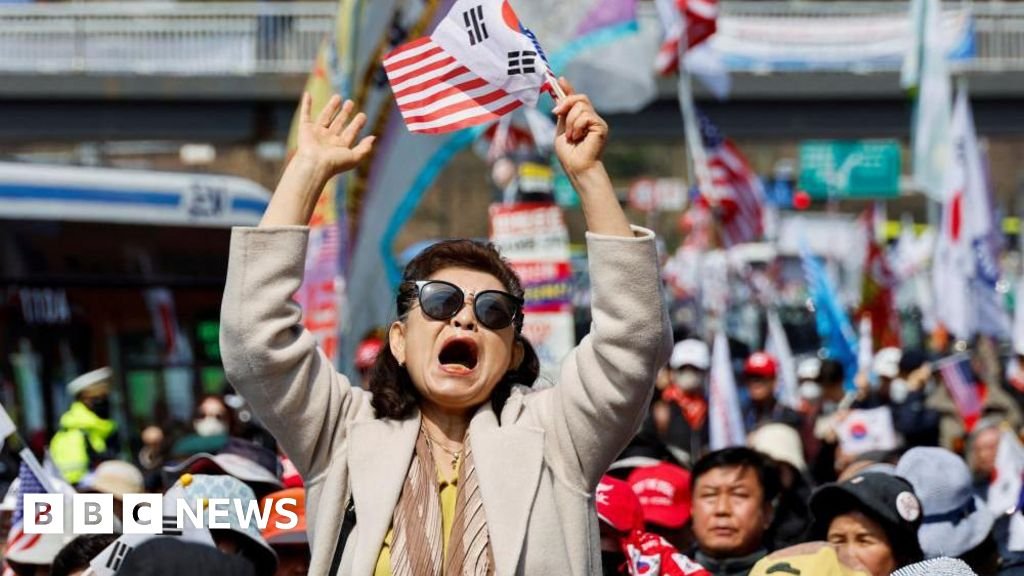Contents
South Korea’s President Yoon Suk Yeol Impeached: Nation Faces Uncertain Future
In a historic ruling, the Constitutional Court of South Korea has unanimously upheld the impeachment of President Yoon Suk Yeol, drawing a dramatic line under months of political turmoil and unrest. As the nation prepares for a snap election, the implications of this decision reverberate through the heart of South Korean democracy.
The Constitutional Court of South Korea has decisively removed President Yoon Suk Yeol from office following a unanimous vote on Friday that confirmed his impeachment. This ruling marks a significant moment in South Korean politics, where turmoil has persisted since Yoon’s controversial declaration of martial law last December. While supporters and critics alike gathered in anticipation of the ruling, the court’s verdict has set the stage for a forthcoming snap election, which must be held by June 3. This momentous event raises profound questions about the country’s democratic integrity and the political landscape moving forward.
The Aftermath of Yoon’s Impeachment
Following months of instability and a political crisis provoked by Yoon’s actions, South Korea now seeks to move forward with a clear path ahead. The unanimous decision by the Constitutional Court provides a much-needed sense of closure for many citizens. However, the ramifications of Yoon’s martial law attempt, which lasted merely six hours, loom large over the nation’s psyche.
- Yoon’s abrupt declaration of martial law on December 3 shocked the public, reviving fears of the country’s autocratic past.
- His decisions have led many to question the balance of power within South Korea’s government.
- Critics argue that Yoon’s actions may encourage future political figures to consider similar authoritarian measures.
Political commentator Kim Sung-hoon emphasized the significance of the court’s ruling, stating, “Today marks a pivotal victory for South Korea’s democracy, reaffirming the judicial system’s role as a guardian against abuses of power.” The acting president of the court, Moon Hyung-bae, echoed this sentiment, condemning Yoon’s actions as a breach of public trust that undermined the principles of democracy.
Calls for Constitutional Reform
In the wake of Yoon’s impeachment, some lawmakers are advocating for constitutional changes aimed at limiting presidential powers to prevent similar crises in the future. However, these potential reforms face challenges, as any significant amendments would require broad political consensus—a steep hill to climb in today’s polarized environment.
The Deepening Divide in South Korean Society
As President Yoon exits the political stage, he leaves behind a deeply divided nation. While many South Koreans celebrated the court ruling, a substantial faction continues to support Yoon, believing he has been victimized by a biased establishment. This division is exacerbated by Yoon’s refusal to concede his political narrative, fostering a climate of distrust towards government institutions.
The persistence of Yoon’s claims—asserting that political opponents are aligned with foreign “anti-state forces”—has resonated with a significant portion of the populace. This development not only complicates upcoming elections but also raises concerns about the rise of far-right extremism and political violence.
- A recent poll indicates that over 33% of South Koreans lack trust in the Constitutional Court.
- Protests against perceived corruption in leadership and judicial processes have become a weekly occurrence in Seoul.
- The political landscape is marked by increasing polarization, as more citizens align themselves with either Yoon’s supporters or his detractors.
As these divisions become more entrenched, the upcoming election looms large. Many analysts warn that the potential for unrest following the results is significant, as both factions remain highly agitated.
Preparing for a New Leader
With a new election mandated by June 3, South Korea stands at a crossroads. The newly elected leader will face the daunting task of unifying a fragmented society while addressing pressing economic concerns exacerbated by international trade tensions. President Yoon’s administration faced criticism for lacking robust responses to external economic pressures, including the imposition of tariffs by the U.S. on South Korean exports.
Political analysts suggest that the next president must prioritize policies that stabilize the economy and restore public trust in governance. “This is a critical juncture for South Korea,” remarked political science expert Yoon Ji-sang. “The new leader must navigate numerous challenges to mend the deep-seated issues plaguing the nation right now.”
Reflections on Yoon’s Presidency
Yoon Suk Yeol’s time in office will be remembered not only for its controversial decisions but also for the broader implications those decisions have had on Korean democracy. Following his declaration of martial law on December 3 last year and the swift backlash that followed, Yoon’s impeachment serves as a cautionary tale regarding the balance of power in governance.
Yoon himself remains defiant, expressing his regrets over failing to meet the expectations of his supporters without acknowledging his impeachment. His political struggle continues to reverberate through his party and among a significant portion of the electorate.
In conclusion, South Korea’s future hinges on the impending election and the possibility of reforming its political structures to prevent a repeat of such crises. As the nation seeks healing and unity, the new leadership must rise to the challenge, underscoring the importance of democracy and accountability.
Keywords: South Korea, Yoon Suk Yeol, impeachment, Constitutional Court, democracy, political crisis, martial law, election, polarization, leadership.
Hashtags: #SouthKorea #YoonSukYeol #Impeachment #Democracy #Election #PoliticalCrisis #MartialLaw #Leadership




